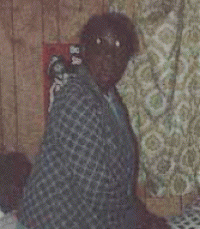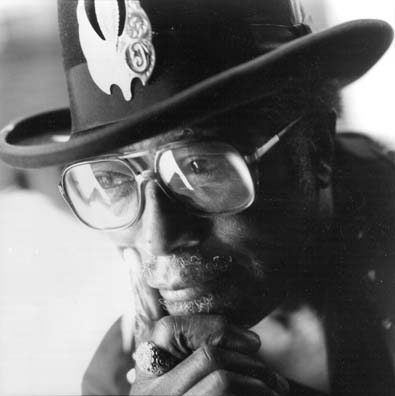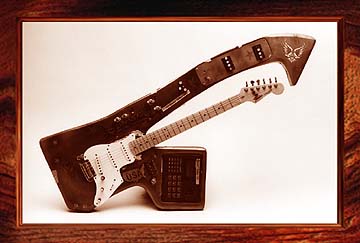
"BO DIDDLEY's momma"
"The Story Of BO DIDDLEY...":
home
history 1928-1955
career 50s / 60s / 70s / 80s / 90s / 00s
70th birthday tributes page 1 / 2 / 3
hot news
forthcoming appearances
discography 45s / lps / comps / misc
downloads/cds
movies
tv & radio
musicians
lady bo page 1 / 2 / 3
jerome green
chatroom
contest
photo gallery page 1 / 2 / 3 / 4 /
5
guestbook & forum
lyrics
mean machine
"originator radio"
rare bo
reading
rocklove review
visitors' comments
dedication
links
Margo Lewis or Faith Fusillo
Co-Managing Partners, The Estate of Bo Diddley
Talent Source Management
105 Shad Row - Second Floor
Piermont, NY 10968
USA
T: 212-730-2701
F: 845-359-4609
E: info@talentsourcemanagement.com
www.talentsourcemanagement.com
You may also contact:
Talent Consultants International (TCI)
email@tciartists.com
www.tciartists.com
"I Don't Sound Like Nobody..."
ELLAS BATES was born on Sunday December 30th 1928 on a small farm near the town of McComb, Mississippi, USA, in rural Pike County, close to the Louisiana border, the only child of Ethel Wilson and Eugene Bates. He had 3 half-brothers and a half-sister. He was adopted by his mother's cousin, Mrs. Gussie McDaniel, along with his cousins Willis, Lucille and Freddie, and adopted the name ELLAS McDANIEL. In the mid-1930's the family moved to the south side of Chicago. Soon after, he began to take violin lessons from Professor O.W. Frederick at the Ebenezer Missionary Baptist Church. He studied the violin for twelve years, composing 2 concertos for the instrument. For Christmas in 1940, his sister Lucille bought him his first guitar, a cheap Harmony acoustic. It was at this time that he acquired the nickname "BO DIDDLEY" ("...BO DIDDLEY is me; to tell ya the truth, I don't know what it (the name) really is...") from his fellow pupils at the Foster Vocational High School in Chicago.The newly-named BO DIDDLEY had long been fascinated by the rhythms that he heard coming from the sanctified churches. A frustrated drummer, he tried to translate the sounds that he heard into his own style. Gradually he began to duplicate what he did with his violin bow by rapidly flicking his plectrum across his guitar strings. "I play the guitar as if I'm playing the drums....I play drum licks on the guitar."
He continued to practice the guitar through his early teens. Shortly before leaving school he formed his first group, a trio named The Hipsters, later known as The Langley Avenue Jive Cats, after the Chicago street where he lived. Upon graduation he pursued a variety of low paid occupations including truck driving, building site work and boxing, playing locally with his group to supplement his income. In 1950 maracas player Jerome Green joined the group, followed a year later by harmonica player Billy Boy Arnold. After more than a decade of playing on street corners and in clubs around Chicago, BO DIDDLEY finally got the chance to cut a demo of 2 songs that he had written; "Uncle John" and "I'm A Man". After various rejections from local record labels, (most notably Vee-Jay), in the spring of 1955 he took the recordings to brothers Leonard and Phil Chess, owners of Chess Records, with studios located at 4750-2 South Cottage Grove Avenue in Chicago. They suggested that he changed the title and the lyrics of "Uncle John" to more reflect his own unique personality.The 2 songs were re-recorded at Bill Putnam's Universal Recording Studio at 111 East Ontario in Chicago on Wednesday March 2nd 1955, and released as a double A-side disc "Bo Diddley"/"I'm A Man" on the Chess Records subsidiary label Checker Records. It went straight to the top of the rhythm'n'blues charts, establishing BO DIDDLEY as one of the most exciting and original new talents in American music.

Inspired by musicians ranging from Louis Jordan to John Lee Hooker and from Nat "King" Cole to Muddy Waters, BO DIDDLEY was now set to help shape and define the sound and presentation of rock music for all time. From Elvis Presley to George Thorogood, from The Rolling Stones to ZZ Top, from The Doors to The Clash, from Buddy Holly to Prince and from The Everly Brothers to Run DMC, all acknowledged the unique influences of BO DIDDLEY upon their styles of music:
- his pounding and hypnotic Latin-tinged beat,
- his oblong, square, pointed, fur-covered, leather-bound, rocket-tailed, custom-built Gretsch electric guitars,
- his innovative use of special effects such as reverb, tremolo and distortion to make his guitars talk, mumble and roar like jet engines,
- his use of female guitarists and musicians, including LADY BO, Duchess, Cookie and, most recently, Debby Hastings and Margo Lewis,
- his distinctive all-black outfit complete with hat and over-sized eagle badge,
- his hopping and strutting around the stage, playing his guitars with his teeth, over his head, between his legs, and every which way...
A tireless campaigner in live performance against the use of misogynistic and dirty lyrics in today's rap music, BO DIDDLEY performed in schools, colleges and churches across the US teaching children and young people the importance of respect and education and the dangers of drugs and gang culture.
He was actively involved with and committed to many charities and non-profit groups across the country and wrote, performed and recorded a number of songs on related themes, including the post-9/11 "We Ain't Scared Of You", the strongly-worded stay-in-school message of "Kids Don't Do It" and the self-explanatory titled "Wake Up America", "Down With The Pusher", "Ain't It Good To Be Free", "I Don't Want Your Welfare", "Gotta Be A Change" and "Hear What I'm Sayin'" etc. He also collaborated on a best-selling album of songs for young children.
In recent years, BO DIDDLEY received numerous accolades in recognition of his role as one of the founding fathers of rock 'n' roll. In 1986, he was inducted into the Washington Area Music Association's Hall of Fame. The following year saw his induction into the Rock 'n' Roll Hall of Fame. His pioneering contribution to the genre has been recognized by the Rockabilly Hall of Fame. In 1996, he was awarded the Lifetime Achievement Award by the Rhythm and Blues Foundation. The following years saw his 1955 debut recording of his song "Bo Diddley" inducted into the GRAMMY Hall of Fame as a recording of lasting qualitative or historical significance and he received a Lifetime Achievement Award at the GRAMMY Awards Ceremony.
The start of the new millennium saw BO DIDDLEY inducted into the Mississippi Musicians Hall of Fame and into the North Florida Music Association's Hall of Fame. In 2002, he received a Pioneer in Entertainment Award from the National Association of Black Owned Broadcasters and a Broadcast Music Incorporated (BMI) Icon Award in recognition of his many contributions to contemporary music.
In 2003, tribute was paid to BO DIDDLEY in the United States House of Representatives by Hon. John Conyers, Jr. of Michigan, who described him as "one of the true pioneers of rock 'n' roll, who has influenced generations".
In 2004, Mickey & Sylvia's 1956 debut recording of his song "Love Is Strange" was inducted into the GRAMMY Hall of Fame as a recording of qualitative or historical significance and he was inducted into the Blues Foundation's Blues Hall of Fame. "Rolling Stone" magazine named him as one of its Immortals-The 50 Greatest Artists of All-Time.
In 2005, BO DIDDLEY celebrated his 50th anniversary in music with successful tours of Australia and Europe and with coast to coast shows across North America. He performed his song "Bo Diddley" with Eric Clapton and Robbie Robertson at the Rock 'n' Roll Hall of Fame's 20th annual induction ceremony and in the UK, "Uncut" magazine included his 1958 debut album "Bo Diddley" in its listing of the 100 Music, Movie & TV Moments That Have Changed The World.
In 2007, BO DIDDLEY went home to Mississippi to receive the Governor's Award of Excellence in the Arts for Lifetime Achievement; the State's highest arts honor and then again for a second visit to see his Blues Marker unveiled on the Mississippi Blues Trail.
BO DIDDLEY died peacefully at his home in Archer, Florida, USA on Monday June 2nd 2008, aged 79 years. President George W. Bush paying tribute to him, said that "he changed the face of music" and "that his memory will live on in the songs and the joy he brought to millions - including a little fellow like me".
In 2009, The Recording Academy paid a posthumous tribute to BO DIDDLEY with an all-star performance at the 51st Annual GRAMMY Awards Ceremony.
At record hops and dances, BO DIDDLEY's original recordings of his songs "Bo Diddley", "Who Do You Love", "Say Man" and "You Can't Judge A Book By The Cover" plus Mickey & Sylvia's recording of his song "Love Is Strange" are all perennial favorites with fans of 1950s and 1960s music.
On the radio, his recording of his 1958 novelty song "Bo Meets The Monster" has become an annual staple of rock & roll Oldies format stations playlists each Hallowe'en. His 1957 recording of his song "Mona" (aka "I Need You Baby") and his 1962 recording of the song "You Can't Judge A Book By The Cover", Mickey & Sylvia and Peaches & Herb's respective recordings of his song "Love Is Strange" and the Yardbirds' recording of his song "I'm A Man" are all staples of rock & roll Oldies format station playlists around the world.
On the Classic Rock format radio stations, Eric Clapton's recording of his song "Before You Accuse Me", Ten Years After's live 1969 recording of his song "I'm Going Home" (aka "Down Home Special"), George Thorogood & The Destroyers' recordings of his song "Who Do You Love" and the Yardbirds' recording of his song "I'm A Man" are all staples of playlists around the world.
- Artist - Record title - Date record first made the Billboard r&b or pop singles charts:
- BO DIDDLEY "Bo Diddley"/"I'm A Man" (May 4th 1955)
- Bill Haley & His Comets "Rock Around The Clock" (May 14th 1955)
- Fats Domino "Ain't That A Shame" (July 1955)
- Chuck Berry "Maybellene" (August 1955)
- The Platters "Only You (And You Alone)" (October 1955)
- Little Richard "Tutti Frutti" (January 1956)
- Elvis Presley "Heartbreak Hotel" (March 1956)
- Carl Perkins "Blue Suede Shoes" (March 1956)
- The Everly Brothers "Bye Bye Love" (May 1957)
- Jerry Lee Lewis "Whole Lot Of Shakin' Going On" (July 1957)
- Buddy Holly & The Crickets "That'll Be The Day" (August 1957)
- Duane Eddy "Rebel-Rouser" (July 1958)
- Ray Charles "What'd I Say (Part 1)" (July 1959)
- James Brown "Think" (May 1960)
- Chubby Checker "The Twist" (August 1960)
- Ike & Tina Turner "A Fool In Love" (October 1960)
- Del Shannon "Runaway" (March 1961)
- The Beach Boys "Surfin' Safari" (September 1962)
- Stevie Wonder "Fingertips (Part 2)" (July 1963)
- The Beatles "I Want To Hold Your Hand" (January 1964)
- BB King "Rock Me Baby" (June 1964)
- The Rolling Stones "Tell Me (You're Coming Back)" (August 1964)
